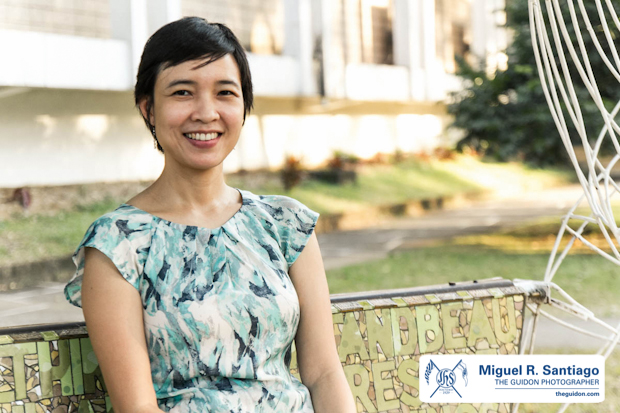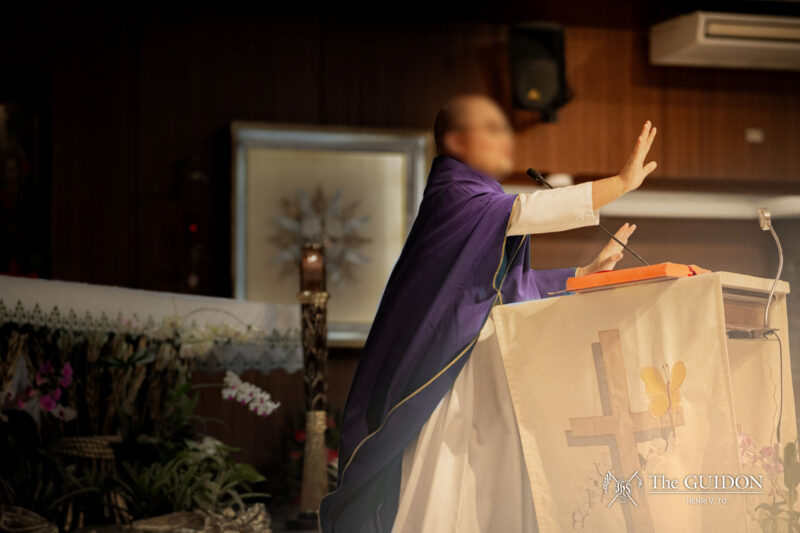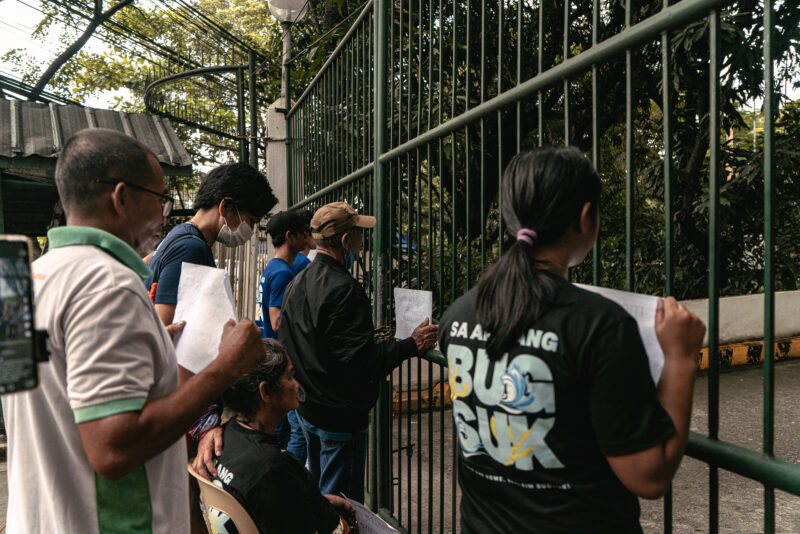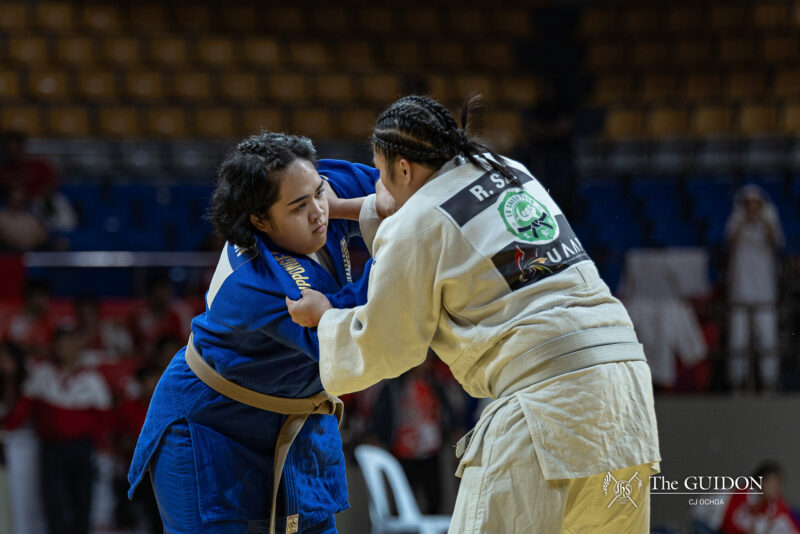
A GENTLE SPIRIT. Literature faculty member cyan Abad-Jugo’s plethora of achievements are belied by her diminutive stature. Photo by Miguel R. Santiago
Having finished her final lecture of the day, Cyan Abad-Jugo, PhD (AB Literature ‘91), who teaches literature at the Loyola Schools, exits her last class and begins the short but tiresome journey back to Horacio de la Costa Hall. Curiously, she does not look like someone who had just come from her fifth class of the day. In fact, she is all smiles.
To the people who know her, this is nothing out of the ordinary. Long known for her gleeful and gentle demeanor, Abad-Jugo is usually described as being incapable of hurting a fly. As Martin Villanueva of the Fine Arts Department says, “[She’s the] kindest person you’ll ever meet. And she doesn’t get outwardly rattled. [She’s a] calming, playful presence.”
True enough, her warm and inviting nature manifests itself as she jubilantly brings up the little things that made her day: funny anecdotes from class, a multimedia message from her husband containing a picture of a billboard promoting The Hobbit, and her children.
Gentleness, however, is only one side of Abad-Jugo’s multifaceted character—just like her critically acclaimed novels, there’s more to her than meets the eye.
The first chapter
Cyan Abad-Jugo graduated from the Ateneo at the tender age of 19, at a time when she and English Department Chair Marianne Perfecto were the only two English literature majors in their year.
Having studied under renowned teachers such as Fr. Joseph Galdon and Dr. Edna Manlapaz for her writing classes, Abad-Jugo says that her stay in the Ateneo further developed her passion for literature. “It’s like [my professors] were so enthusiastic about the things that we had to read for class, that I couldn’t help but have their enthusiasm rub off on me.”
Interestingly, it appears that the eagerness she picked up from her teachers persists to this day. “She’s always eager to teach,” says management honors freshman John Cocabo. “She personifies her own passion [for teaching] through it.”
Her love for literature was not only confined to the constraints of the classroom. She was also an active member of Heights, the preeminent literary organization of the Ateneo. Being a member for three years, she says that her time with the organization helped her refine her writing style.
Later on, she decided to take up graduate studies at Simmons College in Boston. Her exposure to the multicultural landscape of the United States further developed her writing style, as did her study under literary behemoths such as the bestselling author Lois Lowry, who was her thesis adviser.
In 1996, Abad-Jugo finally released her debut novel Father and Daughter: The Figures of Our Speech, alongside her father, the renowned poet Gémino Abad.
Putting pen to paper
Having spent decades practicing her craft, Abad-Jugo claims that her style has changed numerous times. She says that initially, many of her earlier pieces were in the form of poetry. It was her classes with legendary Filipino writer NVM Gonzales that convinced her to make the switch to fiction.
When asked about her preferred genre, she says that most of her works can be categorized as realist fiction. Despite this, she says that she has also dabbled in fantasy due to the influence of writers such as Luis Katigbak and the husband-and-wife team of Dean and Nikki Alfar.
Quite noticeably, many of her works cater to a relatively young audience. “She specializes in that particular field of storytelling and does it well. She really captures the voice of a child,” says junior creative writing and English literature major Matthew Olivares.
However, Abad-Jugo, who is widely known for the children’s book Leaf and Shadow: Stories About Some Friendly Creatures, reveals that she did not so much plan to enter children’s literature as she did stumble into it. Despite this, she has no regrets about venturing into the genre, as it allowed her to explore a field that her famous father and grandfather have not.
Her work in this area has not gone without praise. “I’ve read her work, and she is a very vivid and imaginative writer,” comments management engineering major Camille Ang, “easily capturing her audience’s attention.”
However, she is wary of being pigeonholed into being a writer of children’s literature. “I’m anxious not to be too comfortable with it because then I’ll be trapped by that voice,” she says. “So from time to time I try to veer away from [that voice], but I always go back to it.”
Hot off the press
Last July, Abad-Jugo released yet another novel, entitled Salingkit: A 1986 Diary. Set during the end of the Marcos regime in the late 1980s, Salingkit details the state of Philippine society through the eyes of its pubescent protagonist, Kitty. But beyond the drama of 1986, Abad-Jugo reveals that Salingkit is also about the much more complicated drama of teenage life.
Unbeknownst to many people, she penned the original incarnation of Salingkit for a penalty course in UP Diliman while working towards her doctorate. Her own journal entries from the 1980s served as the first draft and source material of what is now a full-fledged novel.
Abad-Jugo says that Salingkit was largely unsatisfactory in its first form, as it was almost entirely in diary format. This led her to conduct further research, allowing the manuscript to further develop into its present form.
Discussing her novel further, Abad-Jugo shares that the protagonist, Kitty, is not completely a projection of herself. “The history part is just the backdrop. It’s really still about the girl growing up in 1986. So it’s really a mix of fact and fiction, it is its own novel. I wouldn’t call it autobiographical.”
The unseen tale
Having come from a long line of writers, one would assume that there may have been a significant amount of pressure on her to pick up the pen. However, she claims that she grew up in a gentle environment, with neither of her parents pressuring her to take up a path she might be uncomfortable with.
“He would never force us into a direction that he knew that we would hate,” she says of her father, Gémino Abad. “He was just himself. He surrounded us with books and he would tell us stories, but it was never a hard sell. I only realized I wanted to write when I saw his books on the shelves.”
“Of course I feel small, but I’m so proud to be descended from writers. It gives me a stamp of approval,” she says, smiling, when asked about how she feels whenever she gets compared to her father or grandfather. Her grandfather is Antonio Abad, one of the foremost Filipino novelists in Spanish during the first half of the 20th century.
But there are also several hidden facets to Abad-Jugo outside of her literary life. She shares that she has a daring side, obscured by her gentle and timid personality. “I swallowed fire once, just because everyone else did it. I think I would be quite a daring person when pushed,” she says.
All the same, she admits that her daring ways might be coming to an end. “I’m growing old. I know that the roller coasters that I used to love riding now make me motion sick. So there will be constraints.”
This isn’t as bad as it seems, though, as she reveals that she would rather spend time with her two “little hobbits” anyway. More than anything, she says that she wants to play a key role in getting her children to live a life of creativity, whether it be in writing or creating art. “I actually want to spend more time with my children—being with them, reading them books, doing things with them.”
Piecing the story together
Looking forward, Abad-Jugo sees herself continuing to be a writer, teacher and student in the future. “I always think I’m a writer first before anything else. And then because I’m a writer, I’m also a student, forever learning what I have to write about. And because I’m a student and learning, I’m also a teacher,” she says.
However, she is also leaving some room for growth. Following fantasy writer Ursula K. Le Guin’s belief in finding the edge of things, she believes she too should try to find the edge through her writing. “Maybe that’s why I keep writing—because I want to get there, the time when my stuff would be more daring, more out there, actually more relatable to the more daring youth of today.”
Aside from personal growth, she also hopes that literature will be able to help bring lucidity in the lives of others as well. According to her, “ It’s only when I write things down that I become clear to myself. I would like to make writing my advocacy. Everyone should write and clarify themselves to themselves.”
Just as the interview is about to end, Abad-Jugo smiles and adds, “I think if you banned me for life from reading and writing, I really would go crazy. Someone called that obsessive-compulsive behavior. But I think that’s just another way to call passion.”






